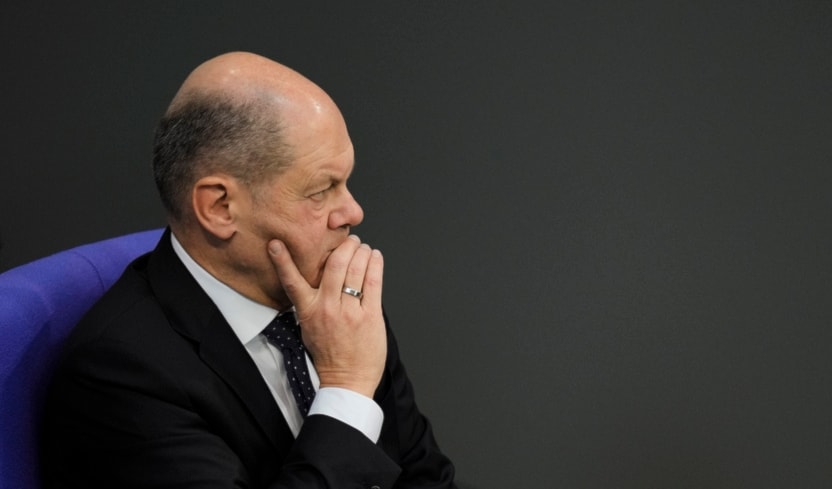Scholz: NATO does not see itself at war with Russia
German Chancellor Olaf Scholz reveals in an op-ed NATO's aversion to war with Russia, days before he heads to the US to discuss plans for military funding to Kiev.
-

German Chancellor Olaf Scholz attends a debate about Germany's budget crisis at the parliament Bundestag in Berlin, Germany, Tuesday, November 28, 2023. (AP)
On Wednesday, German Chancellor Olaf Scholz revealed that NATO member countries are not planning on confronting Russia in a war.
"We don’t see ourselves at war with Russia and don’t seek confrontation with Russia," the chancellor said in an op-ed for the Wall Street Journal.
He added that NATO will avoid direct inclusion in the Russian-Ukrainian war.
Scholz also addressed the military aid Ukraine has been receiving, saying Germany comes right after the United States in terms of the magnitude of funding.
However, he said "Ukraine could soon face serious shortages in arms and ammunition" as "some financial commitments have already run out, and others need to be extended," despite Western funding.
In this context, he also revealed that in case the United States suspends all funding to Ukraine, Germany would not be able to cover the discrepancy to make up the difference it would create.
"That is, I believe, the real danger we currently face," Reuters reported, citing Scholz.
The chancellor is expected to head to Washington on Thursday for a meeting with Joe Biden that will take place on Friday. The meeting's agenda includes discussing support for Ukraine amid the US funding conflict, as well as the European Union's $54 billion military package it had allocated for Kiev.
Read more: NATO chief says world 'must be prepared for bad news' from Ukraine
Ukraine funding in limbo
Despite exasperations in Congress over the Ukraine military fund versus the national security crisis, US senators unveiled last Sunday the text of a highly anticipated agreement that would allocate substantial new aid for Ukraine and the Israeli occupation entity, while simultaneously implementing stricter US border laws.
The proposed national security supplemental legislation encompasses a total funding of $118.3 billion. This includes $60 billion to support Ukraine, aligning with the White House's request, and $14.1 billion in security assistance designated for "Israel", as outlined in a summary provided by Senate Appropriations Committee chair Patty Murray.
This comes after Ukraine's President Volodymyr Zelensky cautioned that a reduction in aid from the United States to Kiev would convey a "negative message", highlighting the challenges faced by US President Joe Biden amid a Republican blockade on additional support.
Keeping in mind the possibility of reduced US aid, Zelensky called on Germany to leverage its economic influence to encourage EU partners to provide more support to Kiev in its struggle against Russia.
"Passivity from the United States or the lack of support would be a bad signal," he said as quoted by German national broadcaster ARD.
Zelensky cautioned that such a situation would be detrimental for everyone.
Read more: Corruption scandal in Ukraine sparks outrage in US Congress

 3 Min Read
3 Min Read









